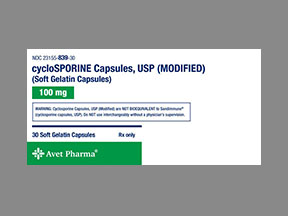
Gengraf Coupons & Savings Card – Discount Prices from $31.08
Brand for: Cyclosporine modified
My prescription
Edit
100MG, Cyclosporine Modified (30 Capsules)
Select pharmacy

CVS
$50.93
COUPON PRICE
Albertsons
$31.08
COUPON PRICE
Walgreens
$45.58
COUPON PRICE
Walmart
$65.81
COUPON PRICEGengraf savings card
Show this card to your pharmacist
Albertsons
$31.08
BIN
ID
PCN
GRP
011867
LH01356E0A
HT
LABH001
Powered by
More prescriptions for rheumatoid arthritis
More prescriptions for rheumatoid arthritis
Price history for Gengraf (brand) & Cyclosporine Modified (generic)
30 Capsules, 100MG
Average retail price for Gengraf
Average retail price for Cyclosporine Modified
Average SaveHealth price for Cyclosporine Modified
Our price history data is based on aggregated prescription data collected from participating pharmacies in America. Our prescription data updates daily to reflect the latest price changes. If you notice a missing data point, it means there wasn't sufficient data available to generate a monetary value for that date.
Over the last 12 months, the average discount price of Gengraf is $56.68 using the SaveHealth savings card. That's an average savings of 66.49% on Gengraf with our discount card.
*Retail prices are based on pharmacy claims data, and may not be accurate when we don't have enough claims.
Gengraf (Cyclosporine Modified) dosage forms
Dosage Quantity Price from Per unit 25MG 1 Capsule $2.99 $2.99 25MG 30 Capsules $17.10 $0.57 25MG 60 Capsules $30.48 $0.51 100MG 30 Capsules $50.93 $1.70 100MG 1 Capsule $1.01 $1.01
| Dosage | Quantity | Price from | Per unit |
|---|---|---|---|
| 25MG | 1 Capsule | $2.99 | $2.99 |
| 25MG | 30 Capsules | $17.10 | $0.57 |
| 25MG | 60 Capsules | $30.48 | $0.51 |
| 100MG | 30 Capsules | $50.93 | $1.70 |
| 100MG | 1 Capsule | $1.01 | $1.01 |
What is Gengraf used for?
Gengraf is used to prevent organ rejection in people who have received a kidney, liver, or heart transplant. It is also used to treat certain autoimmune conditions, such as severe rheumatoid arthritis and psoriasis, when other treatments have not been effective.
Is Gengraf the same as cyclosporine?
Gengraf is a brand name for a formulation of cyclosporine. Cyclosporine is the active ingredient in Gengraf, which is an immunosuppressant medication.
What foods should you avoid on Gengraf?
When taking Gengraf (cyclosporine), it is advisable to avoid consuming grapefruit and grapefruit juice. Grapefruit can interfere with the metabolism of the medication, potentially leading to increased levels in the blood and a higher risk of side effects. It is also important to maintain a consistent diet and avoid significant changes in the intake of potassium-rich foods, as cyclosporine can affect kidney function and potassium levels. Always consult with a healthcare provider for personalized dietary advice while on Gengraf.
Which of the following side effects are likely with Gengraf therapy?
Gengraf, which contains cyclosporine, may cause several side effects. Common side effects include hypertension (high blood pressure), renal dysfunction, tremors, hirsutism (excessive hair growth), and gingival hyperplasia (gum overgrowth). Other possible side effects are headache, nausea, diarrhea, and increased risk of infections due to immunosuppression. It is important for patients to be monitored regularly by their healthcare provider while on Gengraf therapy.
What is the generic name for Gengraf?
The generic name for Gengraf is cyclosporine.
